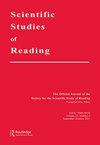词汇访问如何适应单词阅读模式?
IF 2.4
2区 教育学
Q1 EDUCATION & EDUCATIONAL RESEARCH
引用次数: 2
摘要
摘要熟练的阅读需要快速准确地访问存储在内存中的先前遇到的单词。然而,很少有研究涉及支持这种词汇访问的技能。基于理论预测,一种可能支持词汇访问的技能是正字法知识。因此,我们的目标是研究词汇访问和拼写知识之间的关系。我们在104名英语四年级儿童的样本中解决了这个研究问题。我们使用实验者创建的定时单词识别测量来评估词汇访问;TOWRE视觉单词效率子测验的单词阅读效率;词汇和亚词汇拼写知识分别与真实和非词汇拼写选择任务有关。我们控制了其他与阅读相关的技能,包括非语言能力和语音意识。一项验证性因素分析证实,词汇获取和单词阅读效率是两个独立的结构。随后的线性回归揭示了亚专业正字法知识和超出控制的词汇访问之间的并发关系。研究结果突出了词汇习得在阅读发展理论中的独特地位,并帮助我们更好地理解快速准确阅读所需的特定技能。本文章由计算机程序翻译,如有差异,请以英文原文为准。
How Does Lexical Access Fit into Models of Word Reading?
ABSTRACT Skilled reading requires fast and accurate access to previously encountered words stored in memory. Yet, little research addresses skills that support such lexical access. Based on theoretical predictions, one skill that may support lexical access is orthographic knowledge. Thus, our goal was to investigate the relation between lexical access and orthographic knowledge. We addressed this research question in a sample of 104 English-speaking fourth grade children. We assessed lexical access with an experimenter-created measure of timed word recognition; word reading efficiency with the TOWRE Sight Word Efficiency subtest; and lexical and sublexical orthographic knowledge with real and nonword orthographic choice tasks, respectively. We controlled for other reading related skills, including nonverbal ability and phonological awareness. A confirmatory factor analysis confirmed that lexical access and word reading efficiency are separate constructs. A subsequent linear regression revealed a concurrent relation between sublexical orthographic knowledge and lexical access beyond controls. Results highlight a unique place for lexical access in reading development theory and help us better understand the specific skills required to read quickly and accurately.
求助全文
通过发布文献求助,成功后即可免费获取论文全文。
去求助
来源期刊

Scientific Studies of Reading
Multiple-
CiteScore
7.20
自引率
2.70%
发文量
26
期刊介绍:
This journal publishes original empirical investigations dealing with all aspects of reading and its related areas, and, occasionally, scholarly reviews of the literature, papers focused on theory development, and discussions of social policy issues. Papers range from very basic studies to those whose main thrust is toward educational practice. The journal also includes work on "all aspects of reading and its related areas," a phrase that is sufficiently general to encompass issues related to word recognition, comprehension, writing, intervention, and assessment involving very young children and/or adults.
 求助内容:
求助内容: 应助结果提醒方式:
应助结果提醒方式:


